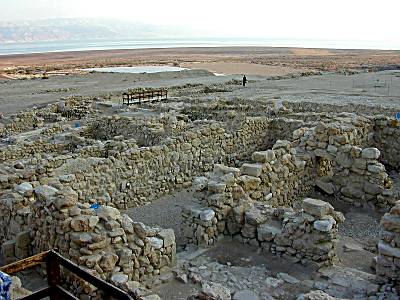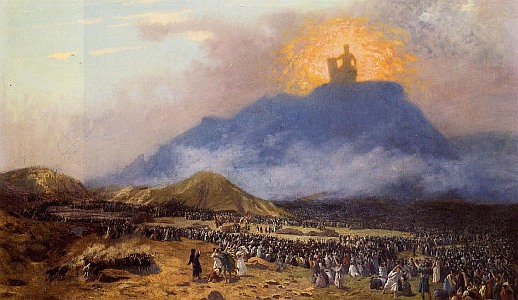A spiritual journal devoted to the Greatest Commandment
Love the Lord your God with all your heart and with all your soul
and with all your mind and with all your strength. (Mark 12:30)
Numbers 13-15; Proverbs 21:22-31
Leviticus 16-18; Proverbs 18:1-12
Click here for Tuesday's Bible Reading.
Devotional thoughts from the book of Leviticus do not come readily to mind, but today I found some help in the margin of my Bible, The Spiritual Formation Bible (now out of print). In reference to Leviticus 16:2-20, it says,
Devotional thoughts from the book of Leviticus do not come readily to mind, but today I found some help in the margin of my Bible, The Spiritual Formation Bible (now out of print). In reference to Leviticus 16:2-20, it says,
Read this passage aloud slowly, imagining yourself as a member of the crowd watching Aaron performing these rites on the very first Day of Atonement. Listen for words that appeal to your senses, and let them help you to become part of the story itself. Then ponder this question: How important is it to have a set, yearly ritual to purify both the people and their place of worship?For Jews, the Day of Atonement is in the fall. Christians celebrate atonement in the spring when we remember Christ's death, burial, and resurrection. The forty days of Lent have similarities to the days leading up to Yom Kippur. We examine ourselves so that God can uproot the sin in our lives. I found an excellent article about this by Sara Yoheved Rigler on the Aish.com website. Click here to read Stalking True Atonement: Pulling Our Misdeeds Out by Their Roots.
Psalms 21-23
Click here for Sunday's Bible Reading.
Be exalted, O LORD, in your strength;
we will sing and praise your might. —Psalm 21:13
WHAT'S FOLLOWING ME?
Surely goodness and love will follow me . . . —Psalm 23:6
While Jay pruned shrubs, Maggie slept quietly in the grass, her leash fastened to the garbage can to keep her from wandering away. All was peaceful in our front yard.
Then the neighbor stopped by to pet Maggie. Startled, Maggie bolted to escape, dragging the garbage can behind her. The clanging of the can intensified Maggie’s terror. She tried frantically to outrun it, but the faster she ran, the louder the can clanged. Jay ran after the dog and the clanging trash can as they banged from driveway to sidewalk to street. But Maggie was too frightened to let him get close. As they circled the cul de sac, garbage flew in all directions. Neighbors gathered to watch. To stop Maggie, Jay had to tackle the garbage can.
Maggie’s trashcan catastrophe reminds me of Psalm 23.
The first five verses tell how God gently leads and feeds us, cares for and protects us. But verse six introduces a subtle change. Instead of talking about how God leads us, the psalmist speaks of what follows us. When I am following God, goodness and mercy will follow me. They are what I leave behind for others, not what I strive to receive for myself.
Like Maggie, we sometimes get fastened to garbage cans. As long as life goes smoothly, we sleep peacefully, unaware of impending danger. But even a small disruption startles us. We try to escape but find ourselves tied to the garbage can of empty values and false promises. In trying to get free, we leave behind a trail of distrust and misunderstanding instead of goodness and love.
To determine how well we’re following God, we need to look at what’s following us. If we see chaos and confusion, it’s likely that we’ve been seduced by the empty promises of a false god. When we turn around and follow the one true God who replicates His character within us, we will begin filling the earth with His goodness and love. —Julie Ackerman Link
thought: The evidence of whether we’re following God is not the blessing we receive but the blessing we leave.
thought: If life seems to be going in circles, perhaps we’re chasing something that’s supposed to be behind us.
question: Is my life tied to the trashcan of worldly values or to the treasure chest of godly character?
question: What god am I following? Wealth? Popularity? Power? Success? Beauty? Education? Physical fitness? Independence? Self-expression? Freedom from moral restraint?
Be exalted, O LORD, in your strength;
we will sing and praise your might. —Psalm 21:13
WHAT'S FOLLOWING ME?
Surely goodness and love will follow me . . . —Psalm 23:6
While Jay pruned shrubs, Maggie slept quietly in the grass, her leash fastened to the garbage can to keep her from wandering away. All was peaceful in our front yard.
Then the neighbor stopped by to pet Maggie. Startled, Maggie bolted to escape, dragging the garbage can behind her. The clanging of the can intensified Maggie’s terror. She tried frantically to outrun it, but the faster she ran, the louder the can clanged. Jay ran after the dog and the clanging trash can as they banged from driveway to sidewalk to street. But Maggie was too frightened to let him get close. As they circled the cul de sac, garbage flew in all directions. Neighbors gathered to watch. To stop Maggie, Jay had to tackle the garbage can.
Maggie’s trashcan catastrophe reminds me of Psalm 23.
The first five verses tell how God gently leads and feeds us, cares for and protects us. But verse six introduces a subtle change. Instead of talking about how God leads us, the psalmist speaks of what follows us. When I am following God, goodness and mercy will follow me. They are what I leave behind for others, not what I strive to receive for myself.
Like Maggie, we sometimes get fastened to garbage cans. As long as life goes smoothly, we sleep peacefully, unaware of impending danger. But even a small disruption startles us. We try to escape but find ourselves tied to the garbage can of empty values and false promises. In trying to get free, we leave behind a trail of distrust and misunderstanding instead of goodness and love.
To determine how well we’re following God, we need to look at what’s following us. If we see chaos and confusion, it’s likely that we’ve been seduced by the empty promises of a false god. When we turn around and follow the one true God who replicates His character within us, we will begin filling the earth with His goodness and love. —Julie Ackerman Link
thought: The evidence of whether we’re following God is not the blessing we receive but the blessing we leave.
thought: If life seems to be going in circles, perhaps we’re chasing something that’s supposed to be behind us.
question: Is my life tied to the trashcan of worldly values or to the treasure chest of godly character?
question: What god am I following? Wealth? Popularity? Power? Success? Beauty? Education? Physical fitness? Independence? Self-expression? Freedom from moral restraint?
Mark 7-11; Proverbs 20:1-10
Click here for Saturday's Bible Reading.
Nicolas Poussin 1593/94–1665
The Healing of the Blind of Jericho (Mark 10:46)

Nicolas Poussin 1593/94–1665
The Healing of the Blind of Jericho (Mark 10:46)

Leviticus 10-12; Proverbs 16:22-33
Click here for Friday's Bible Reading.
CLEAN OR UNCLEAN?
Living out of a suitcase requires a skill that I lack: organization. So whenever I travel, I put my limited abilities into high gear so I’ll be sure to have everything I need.
On the last morning of a week-long trip out east, I got out of the shower and started to get dressed. But I couldn't find my clean underwear. I looked through my side of the suitcase, and then I looked through Jay's side. I looked under the suitcase, and then I looked in another suitcase. No sign of any underwear. Finally I asked Jay if he knew what had happened to it.
"Was it in a plastic bag?" he asked.
"Yes," I answered.
"Well, there were two plastic bags with underwear in them," he announced, as though the information would be news to me.
"I know," I said, "So where are they now?"
"I combined them."
"You did what?" I moaned. “Why would you do that?"
"I was just trying to help you get organized."
"But I was organized. I had them separated for a reason. One was clean and one was dirty."
"I'm sorry. I didn't know," he apologized.
"Why didn't you ask me before putting them together?"
"They all looked the same."
"Did you try smelling them?"
"No."
"Where are they now?"
"I put them all together with my dirty underwear."
After I sniffed my way through his and my dirty clothes and found a pair of underwear that seemed relatively clean, I calmed down and returned to a state of low-level civility.
When Jay sensed that it was safe to speak again, he said, "I don't want this story turning up in 'Our Daily Bread.'"
I hadn't even thought about the possibility until he mentioned it, but as soon as he warned me not to use it, I thought of a possible application. In our Bible reading, we had recently finished the book of Leviticus, which says, "You must distinguish between the holy and the common, between the unclean and the clean" (10:10).
In a world still swirling in sin thousands of years after its catastrophic collision with evil, this is an important task and God has given the assignment to his followers. What separates God’s people from everyone else is the wisdom he gives that enables them to discern good from evil, holy from common, sacred from profane, clean from unclean. And it goes far beyond clean and dirty clothes.
Shortly after we got back to Michigan, I was gone for a while one afternoon. When I got home, I went into the bedroom to see what Maggie had "accomplished" while I was away. Tucked neatly under Jay's pillow I found a pair of my dirty underwear.
I smiled as the word "justice" came to mind.
Unlike Jay, Maggie has learned to discern clean from unclean. Unfortunately, she prefers unclean. Maggie will always be attracted to old smelly clothes. They are as comforting to her as some of my old dirty sins are to me.
Thanks to Jay and Maggie, I am reminded that the kind of discernment God was trying to teach the children of Israel requires more than just physical senses, and it enables me to do tasks that are much more important than sorting dirty clothes.
Click here to read the Our Daily Bread version. :-)
CLEAN OR UNCLEAN?
Living out of a suitcase requires a skill that I lack: organization. So whenever I travel, I put my limited abilities into high gear so I’ll be sure to have everything I need.
On the last morning of a week-long trip out east, I got out of the shower and started to get dressed. But I couldn't find my clean underwear. I looked through my side of the suitcase, and then I looked through Jay's side. I looked under the suitcase, and then I looked in another suitcase. No sign of any underwear. Finally I asked Jay if he knew what had happened to it.
"Was it in a plastic bag?" he asked.
"Yes," I answered.
"Well, there were two plastic bags with underwear in them," he announced, as though the information would be news to me.
"I know," I said, "So where are they now?"
"I combined them."
"You did what?" I moaned. “Why would you do that?"
"I was just trying to help you get organized."
"But I was organized. I had them separated for a reason. One was clean and one was dirty."
"I'm sorry. I didn't know," he apologized.
"Why didn't you ask me before putting them together?"
"They all looked the same."
"Did you try smelling them?"
"No."
"Where are they now?"
"I put them all together with my dirty underwear."
After I sniffed my way through his and my dirty clothes and found a pair of underwear that seemed relatively clean, I calmed down and returned to a state of low-level civility.
When Jay sensed that it was safe to speak again, he said, "I don't want this story turning up in 'Our Daily Bread.'"
I hadn't even thought about the possibility until he mentioned it, but as soon as he warned me not to use it, I thought of a possible application. In our Bible reading, we had recently finished the book of Leviticus, which says, "You must distinguish between the holy and the common, between the unclean and the clean" (10:10).
In a world still swirling in sin thousands of years after its catastrophic collision with evil, this is an important task and God has given the assignment to his followers. What separates God’s people from everyone else is the wisdom he gives that enables them to discern good from evil, holy from common, sacred from profane, clean from unclean. And it goes far beyond clean and dirty clothes.
Shortly after we got back to Michigan, I was gone for a while one afternoon. When I got home, I went into the bedroom to see what Maggie had "accomplished" while I was away. Tucked neatly under Jay's pillow I found a pair of my dirty underwear.
I smiled as the word "justice" came to mind.
Unlike Jay, Maggie has learned to discern clean from unclean. Unfortunately, she prefers unclean. Maggie will always be attracted to old smelly clothes. They are as comforting to her as some of my old dirty sins are to me.
Thanks to Jay and Maggie, I am reminded that the kind of discernment God was trying to teach the children of Israel requires more than just physical senses, and it enables me to do tasks that are much more important than sorting dirty clothes.
Click here to read the Our Daily Bread version. :-)
Leviticus 7-9; Proverbs 16:12-21
Click here for Thursday's Bible Reading.
Portions of the book of Leviticus were found in the caves of Qumran.
THE SCRIPTORIUM

Portions of the book of Leviticus were found in the caves of Qumran.
THE SCRIPTORIUM

On the basis of inkwells and "writing benches" found in this room, archaeologists have suggested that the second story room of this building was the place where scrolls were copied.Click here for more information about Qumran from BiblePlaces.com.
No scrolls were found in this room or in the ruins of the site itself. But the same type of unique pottery was found both on site and in the caves with the scrolls, helping to connect the two. —picture caption from BiblePlaces.com
Mark 1-6; Proverbs 15:1-11
Click here for Saturday's Bible Reading.
........................................................
ALL RISE
Read: Mark 2:1-12
All were amazed and glorified God. —Mark 2:12
When I asked Jay to buy eggs on his way home so I could make cornbread for supper, he said, “I’ve got something better than cornbread.” Coming from Jay, that was a surprising statement, but I learned what he meant when he walked into the house and handed me a fresh loaf of homemade cinnamon bread. A label on the wrapper said, “Thanks for the dough. We kneaded it.”
The bread was made by Sue Kehr and given as a “thank you” for a donation to a youth organization. Sue started making bread in 1991 after having to quit her job as a nurse due to a head injury sustained in a car accident. Someone gave her a batch of “starter” for sourdough bread, and Sue started using it for ministry.
Instead of letting circumstances pull her down when she could no longer help people in her usual ways, Sue rose to a new challenge and created a unique expression of gratitude—making and giving away homemade bread.
Although Sue did not receive complete physical healing, she did, like the paralytic Jesus healed, rise up and cause many to be amazed at the work of God in her life.
God has something for each of us to do, and no physical limitation can keep us from rising up and doing it. —Julie Ackerman Link
Click here to read the published version in Our Daily Bread.
........................................................
ALL RISE
Read: Mark 2:1-12
All were amazed and glorified God. —Mark 2:12
When I asked Jay to buy eggs on his way home so I could make cornbread for supper, he said, “I’ve got something better than cornbread.” Coming from Jay, that was a surprising statement, but I learned what he meant when he walked into the house and handed me a fresh loaf of homemade cinnamon bread. A label on the wrapper said, “Thanks for the dough. We kneaded it.”
The bread was made by Sue Kehr and given as a “thank you” for a donation to a youth organization. Sue started making bread in 1991 after having to quit her job as a nurse due to a head injury sustained in a car accident. Someone gave her a batch of “starter” for sourdough bread, and Sue started using it for ministry.
Instead of letting circumstances pull her down when she could no longer help people in her usual ways, Sue rose to a new challenge and created a unique expression of gratitude—making and giving away homemade bread.
Although Sue did not receive complete physical healing, she did, like the paralytic Jesus healed, rise up and cause many to be amazed at the work of God in her life.
God has something for each of us to do, and no physical limitation can keep us from rising up and doing it. —Julie Ackerman Link
Click here to read the published version in Our Daily Bread.
Exodus 37-38; Proverbs 14:25-35
Click here for Friday's Bible Reading.
....................................................
THE SENSUAL CHRISTIAN
Read: Exodus 37:1-9
Every good and perfect gift is from above. —James 1:17
Due to widespread indulgence in sensual gratification, sensuality has gotten a bad reputation. Surprisingly, however, God is not opposed to sensual pleasure. How can I be sure?
First, God created our senses, and all that He created is good.
Second, God made sensuality a part of worship. Consider God’s first formal worship setting. We call it a tabernacle, but it was really a tent—a very elaborate tent! It housed an ornate, gold-covered ark which held the stone tablets God gave to Moses on Mt. Sinai (obviously God is not against beauty). It had an altar of incense where priests were to burn a blend of fragrant spices made by a perfumer (obviously God approves of pleasant aromas). It had an elaborate table with plates and pitchers (apparently God appreciates a well-appointed dining experience). Around the tabernacle were curtains made from colorful yarn and finely twisted linen (obviously God appreciates color and texture). Music was a component of worship as well, as we learn from 2 Chronicles 29:28 (apparently God enjoys pleasing sounds).
Yes, God values what looks, sounds, smells, tastes, and feels good, and He wants us to enjoy them. But He doesn’t want us to worship them; He wants our enjoyment to remind us to worship Him, the creator and giver of all good things. —Julie Ackerman Link
Praise God from whom all blessings flow;
Praise Him all creatures here below.
Praise Him above ye heavenly host;
Praise Father, Son, and Holy Ghost. Amen.
Click here to read the published version in Our Daily Bread.
....................................................
THE SENSUAL CHRISTIAN
Read: Exodus 37:1-9
Every good and perfect gift is from above. —James 1:17
Due to widespread indulgence in sensual gratification, sensuality has gotten a bad reputation. Surprisingly, however, God is not opposed to sensual pleasure. How can I be sure?
First, God created our senses, and all that He created is good.
Second, God made sensuality a part of worship. Consider God’s first formal worship setting. We call it a tabernacle, but it was really a tent—a very elaborate tent! It housed an ornate, gold-covered ark which held the stone tablets God gave to Moses on Mt. Sinai (obviously God is not against beauty). It had an altar of incense where priests were to burn a blend of fragrant spices made by a perfumer (obviously God approves of pleasant aromas). It had an elaborate table with plates and pitchers (apparently God appreciates a well-appointed dining experience). Around the tabernacle were curtains made from colorful yarn and finely twisted linen (obviously God appreciates color and texture). Music was a component of worship as well, as we learn from 2 Chronicles 29:28 (apparently God enjoys pleasing sounds).
Yes, God values what looks, sounds, smells, tastes, and feels good, and He wants us to enjoy them. But He doesn’t want us to worship them; He wants our enjoyment to remind us to worship Him, the creator and giver of all good things. —Julie Ackerman Link
Praise God from whom all blessings flow;
Praise Him all creatures here below.
Praise Him above ye heavenly host;
Praise Father, Son, and Holy Ghost. Amen.
Click here to read the published version in Our Daily Bread.
Exodus 31-33; Proverbs 14:1-11
Click here for Wednesday's Bible Reading.
Today is the first day of Lent, a forty-day period of fasting and repentance in preparation for Easter.
Today's Bible reading is related, in that Moses is on Mt. Sinai meeting with God and fasting for forty days.
Jacques de Letin 1597–1661
Moses at Mount Sinai (Exodus 31:18)


Click here for more information about Mt. Sinai from BiblePlaces.com.

Today is the first day of Lent, a forty-day period of fasting and repentance in preparation for Easter.
Today's Bible reading is related, in that Moses is on Mt. Sinai meeting with God and fasting for forty days.
Jacques de Letin 1597–1661
Moses at Mount Sinai (Exodus 31:18)


Click here for more information about Mt. Sinai from BiblePlaces.com.

Exodus 25-27; Proverbs 13:1-12
Click here for Monday's Bible Reading.

"And let them make Me a sanctuary, that I may dwell among them." —Exodus 25:8
Click here to read Chuck Colson's BreakPoint column "Art, Worship, and the Bible," which references this Scripture passage.

"And let them make Me a sanctuary, that I may dwell among them." —Exodus 25:8
Click here to read Chuck Colson's BreakPoint column "Art, Worship, and the Bible," which references this Scripture passage.
Matthew 23-28; Proverbs 12:15-28
Click here for Saturday's Bible Reading.
Andrea Mantegna 1431–1506
The Agony in the Garden (Matthew 26:36)

Andrea Mantegna 1431–1506
The Agony in the Garden (Matthew 26:36)

Subscribe to:
Comments (Atom)